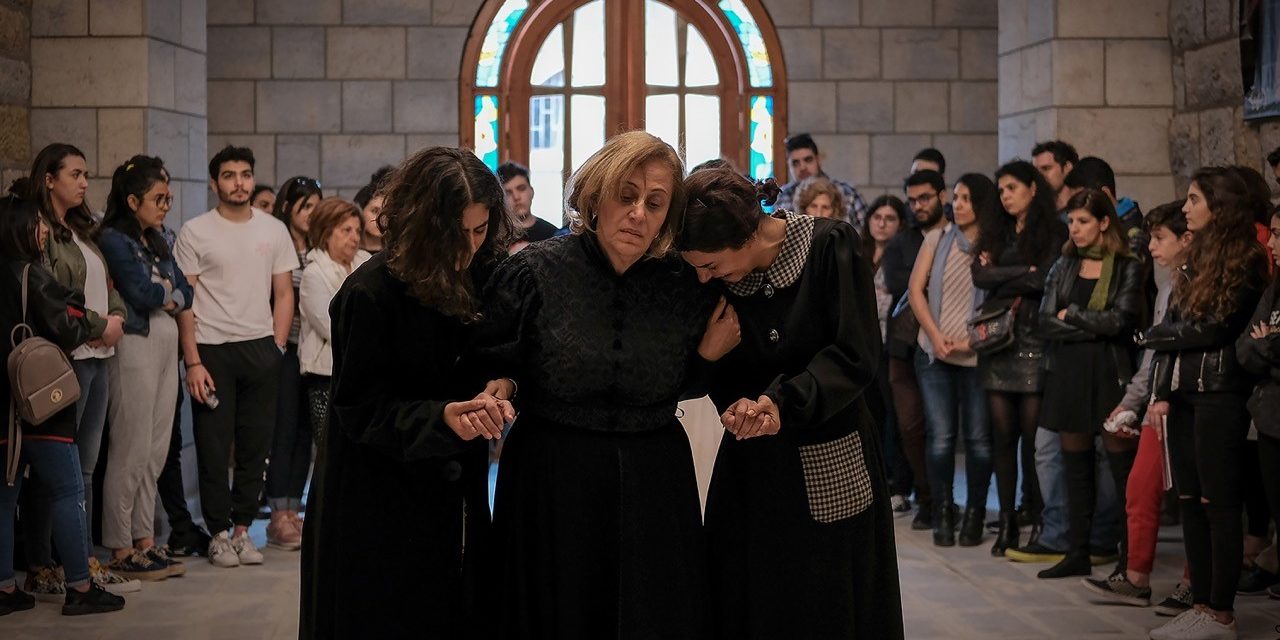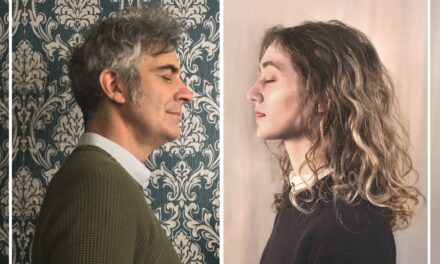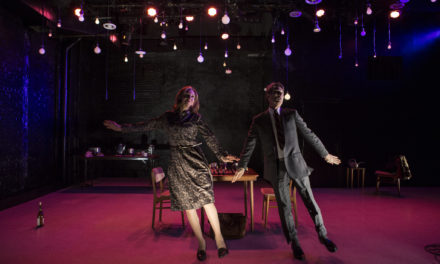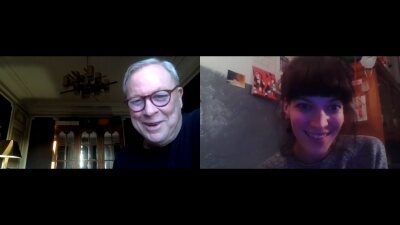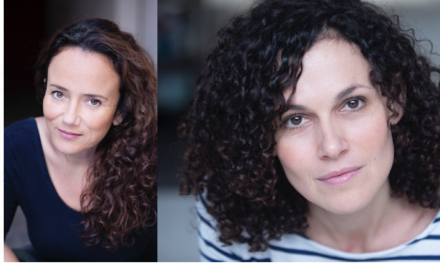Peter Eckersall: How did you come into theatre and how did you start working around this idea of theatre of the real?
Sahar Assaf: My journey in the theatre goes back to when I was maybe fifteen or fourteen when I really knew that this was what I would like to do. I was living in Warhanieh, a small village in the Shouf Mountains of Lebanon, and wasn’t really exposed that much to theatre. I grew up during the civil war (1975–90), and I was kind of sheltered in that village. I would go to a school in a village close by and come back. The only play that I remember seeing when living the first sixteen years of my life up there was a children’s play. I remember clearly; it was a vivid feeling that I wanted to be up there.
I come from a conservative society, and in some societies in Lebanon the profession of theatre, especially for an actress, is not extremely acceptable. It’s not something that people “respect” for many different reasons, so I was a little bit challenged by my family.
When I went to school, I ended up studying journalism. I did journalism for my BA and I focused on radio, TV, and film, and I got interested in documentary filmmaking. I made my first documentary on the nomads in Lebanon. I went and did some research and then made that documentary on my own, but I was still trying to do theatre really.
Then I applied to come to the American University of Beirut (AUB) and work as a graduate assistant, and I had an opportunity to work with the anthropology professor Intisar Azzam. She was doing an anthropological study on my community. I worked with her and I did a master’s degree in sociology.
I think both journalism and sociology created this interest in me and research in people’s stories. When I was doing my master’s degree, I started engaging myself in theatre. I would act in plays outside the campus here. I was the drama club president on campus and I would create some shows, and the first job I got was as an acting-club advisor for a private university in Beirut. I think my drive was basically my passion for this field that I didn’t get to study at first. I was self-taught, basically, when I started.
I couldn’t pay my expenses doing theatre. I was only acting and taking any opportunity that was coming my way, sometimes free-of-charge as actors do. I had to find a full-time job, and I ended up working in a school at first, then I worked with non-government organizations here in Lebanon that work with refugees. I worked for a year with Iraqi refugees in a community center and in the Palestinian refugee camp in the south of Lebanon. That was until I got a Fulbright Scholarship and went to the US and did a master’s degree in Theatre Studies in Ellensburg, at Central Washington University. There I got the opportunity to learn theatre but also to do a summer conservatory in acting. I did an internship with Chicago Dramatists in Chicago, the non-profit theatre that focuses on playwriting. My plan was to come to Beirut and use that degree to teach theatre, living for teaching something that I love, and start to do that work here.
I think all these experiences, my education in journalism and sociology accompanied by my work with the people in the social field, whether children at school or communities at risk, created this interest in me of using theatre to really say something or to use it as a political tool, as a social tool. Right now, it keeps surfacing in my work, this interest. I would do Shakespeare or Lorca, but I’m triggered by what’s happening around me and society, and I use that to create work. Using what I love and what I know most, which is theatre as a medium.
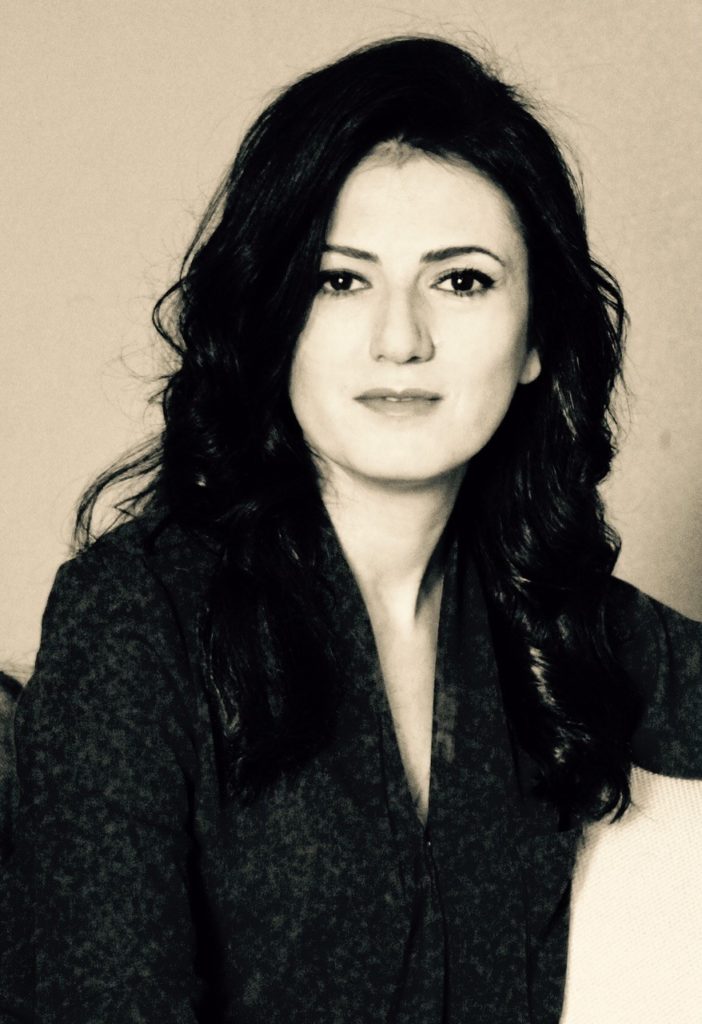
Sahar Assaf. Photograph by Ryan Ghanam.
P. Eckersall: Could you say a little more about what your community is?
S. Assaf: I grew up in a small village in Mount Lebanon that belongs to the Druze religion. Living in Lebanon during the civil war, all these communities were basically formed around religious groups. You would either live in an area that’s the majority, if not all, Muslim or Christian or Druze. The Druze religion that I belonged to, that I was born into. I love and respect the culture but, as I said, I’m not religious, so it doesn’t drive me. But it’s very peculiar in its own ways. The system of belief, and that communication between the villagers, it’s not secluded but it’s not very open. It’s not open to the world or even to the country.
P. Eckersall: How do you work as an artist in this place? First of all, you have a company. And you are doing quite a few different jobs, aren’t you? You are a director and a playwright…
S. Assaf: I don’t call myself a playwright. I edit or re-write material for documentary theatre, but I really don’t consider myself to be a playwright. I’m more of an actor and a director. Right now, my full-time job is the assistant professorship, the position I hold at AUB teaching theatre to students from different majors. We don’t have a major in theatre here, so it’s a minor program in theatre. I teach acting, directing, and production courses, and sometimes theoretical courses in subjects I’m interested in exploring. I co-direct and co-founded the Theatre Initiative at AUB with playwright Robert Myers, where we are responsible for producing all the shows that are supported by the institution here at AUB.
We’re not yet a center, we’re an initiative, so it’s only Robert and me: an ensemble of two. We fill all the jobs that need to be filled. He’s usually the producer, dramaturg, and translator. I’m usually the translator, director, and sometimes actor. All these productions would engage the students as well. They’re part of a class but they’re bigger than a class. We’re trying to produce theatre for the university or that starts at the university but is actually for the local and national community, Lebanon, and the outside world. But at the same time, I also created a theatre company called Tahweel—
P. Eckersall: What does this name mean?
S. Assaf: It means transformations. It’s T-A-H-W-E-E-L with other local actors here in Lebanon. The idea was to create a laboratory that would allow us to engage in work, eclectic work; things that we’re interested in exploring. We did, for instance, adaptations and translations of international plays. We also worked on putting on stage Lebanese texts, like The Dictator, by Issam Mahfouz, in English and Arabic. We’re trying to work in both languages in Lebanon and outside of Lebanon to build bridges. It’s something that interests us. I think theatre is a language on its own.
P. Eckersall: Is there much of a theatre community in Lebanon that you’re working with? Is it a very large group of people who are interested in working in theatre?
S. Assaf: It’s much better now than, I would say, ten years ago. There are many, many theatre groups forming and producing work locally, regionally, and internationally. Here at AUB with the Theatre Initiative, we now have many collaborators in the country. Over the years, starting in 2013, we would work with someone and then call them again for another job. With time, we find ourselves going back to the same designer, et cetera. Unofficially, they’re a part of the ensemble, as well.
In the country, people are more prone to using theatre not only as art for art’s sake but also as a political medium. I know groups now working on drama therapy, playback theatre, improvisation, and using theatre to address issues faced by refugee communities, by women migrant workers, by women survivors of domestic violence, sexual assault, et cetera. The theatre is being used at a larger scale in Lebanon today, which is interesting because it becomes the main tool for the artists to really fight the system and fight the injustice that they face. Whenever there’s a conflict, I feel that people are returning more and more to theatre, although it lacks institutional or governmental support. Artists here always find ways to do the work that they need to do. I like that and I’m proud of that.
P. Eckersall: What are some of the issues that you’re working with that you find motivating or challenging you as an artist?
S. Assaf: I try to engage with the things that affect me as a person, as a human being. To give you examples of work I’ve done using the documentary theatre techniques, one of them was here at AUB. In 2016, the university commemorated its 150th anniversary, and there were all sorts of projects going on celebrating intellectuals and figures that passed through the university. I did a performance about women pioneers who delivered important public speeches at AUB at the beginning of the 20th century; it was a reenactment of these speeches. I also noticed that no one was really thinking about the workers, the janitors, so I decided to put on a play that would honor them and share their experience. That’s a play that used documentary techniques such as interviewing the janitors but also members in the community and putting their stories in the framework of a play, which ended up being a site-specific promenade performance.
We tried to give the audiences an experience of what it means to be a janitor for a day at AUB. The moment the audience arrived, the actors playing the supervisors would transform them into janitors on their first day of work and would hand them the outfit that the janitors would wear. They would put it on, walk from location to location; we even had the audience learn how to clean bathrooms. The idea was to sensitize them to the fact that janitors are an important part of our community but they’re invisible in a way. Sometimes they don’t feel welcome. They got a chance to voice issues they had, like complaints to the administration, and good stories that they experienced but also bad events.
Right now, I’m developing a play that I started in 2017 about sex trafficking. We had a huge issue in Lebanon in April 2016 when the police raided two brothels in the east side of Beirut in an area called Jounieh. They raided two brothels and saved seventy-five Syrian women from sex trafficking. They had been abused for the last ten years or so. The trafficking network has been there for the last ten years. We don’t know the details of all the stories for all of the women. At the moment of the raid, there were seventy-five women in that building and they were released. This was the first time the police in Lebanon dealt with these people as victims of trafficking, and not as prostitutes, which was an improvement.
P. Eckersall: Victims, not criminals.
S. Assaf: Exactly. The laws of prostitution in this country are vague, and usually, it’s the women who are held responsible for an act of prostitution, and a customer or even a pimp would get minor prosecution. That story for some reason affected me more than a lot of things going on around us. That story was very impactful in a negative way, and I decided I would like to do something about it. I wanted to share these stories using theatre. That was my initial motivation, and I was supported by the Center of Arts and Humanities at AUB to put these stories on stage. I started my research and collected interviews with the colonel who raided the brothels and with investigative reporters who interviewed some of the women survivors. For the first performance, I had no access to the women because I was doing my research around seven months after they were saved, and the NGOs wouldn’t give me access to them because they weren’t sure . . .
P. Eckersall: It’s an ethical issue—
S. Assaf: Exactly. Some of them were released, and because there was no support for them from the Lebanese government, they were released with no protection. We have no idea where they went. For some, we knew there was no way they could go back to their families in Syria because it would have been a big issue. Some of these families wouldn’t understand. I did the interviews with the people who helped uncover the story, from the colonel to the investigative reporters, and I tried to access a doctor engaged in the trafficking ring (a gynecologist who was on the payroll with the network). He confessed to doing more than two hundred abortions.
While meeting with Ghada Jabbour, Co-founder and Head of Unit at Kafa (enough) Violence & Exploitation, an NGO, whose work is focused on domestic violence, prostitution, and migrant workers, she gave me a copy of a sociological study she did in 2013 about prostitution–but from the perspective of the buyer, the males, the exploiters. When I read this and put it side by side with the story, I discovered that there was really no mention of the buyer in any of the news reports that came out around the story. Journalists and mainstream media were talking about the network, the trafficker himself, the man who was in charge of torturing the women, the lead figure of the network, the abortion doctor, and even the general security forces who were conspiring with the network because they were being bribed. They talked about everyone. The women’s stories were sometimes put on TV without any sort of self-censorship to sensitize people, but there was no mention of the men who were also part of this and who were really supporting the network whether they knew or not.
The police report said that the network was making one million dollars a month, which is a huge figure compared with the number of women there. If you just do the math of how many men were part of this…it’s a big number. I decided to refocus the work by adding the sex buyer into the equation because the other stories were being shared and shared on TV. This is where I think theatre is very important, and especially with this kind of theatre.
Now, on reflection, I’d like to say that the process itself is documentary theatre and it’s really immersed in reality. The product is always subjective because there is one person creating, editing, adapting these stories–it’s me in this case. Everything I’m sharing on stage is based on either an interview or a document or a study; however, the selection and how I’m structuring the story together makes it also my story. What is it that I’m telling? I chose to focus on the buyer because I felt that this is a link that was ignored by the mainstream media.
P. Eckersall: What’s the title of your piece?
S. Assaf: No Demand, No Supply. I used that phrase from Ghada Jabbour’s sociological study. They are abolitionists and they believe that if we work on the demand, the problem of prostitution could be eradicated. The idea, and what I’m trying to understand is: “Why do we always talk about women in stories of prostitution or trafficking?” Women are the victims and they are abused. They are the survivors but there is another important element that we always tend to keep invisible and anonymous. By doing that, we are protecting that element.
Right now, I am in the process of reworking the show. It was presented only three times in Lebanon and then we played it in Athens within the framework of the Between the Seas Festival, which was actually founded in New York. The idea is that the festival would alternate years between Athens and New York. In 2019, the festival will be in New York, and I was invited to present the show there. I’m using the opportunity to rework the performance itself, the structure that it took. For that, we are inviting Laurie Lathem from Tectonic Theatre Project to AUB; she will give a workshop on Tectonic’s “moment work” methodology of making documentary theatre. We will use that chance to look at the performance after almost a year since we presented it the first time, to look at it in a new way and try to crack some new things up. The idea is to present it in Lebanon around different villages. I’m using it as a discussion instigator because what was really nice about the three shows that we did in Beirut was that the play was sixty-five minutes, but sometimes the talkback would take an hour and a half. Audiences would stay, and they would be engaged and they would ask questions.
P. Eckersall: Do you lead the talkback?
S. Assaf: I led the talkback with the expert on prostitution and sex trafficking from the NGO, Ghada Jabbour. Both of us were on stage, and the actors also, to answer questions and reflect on the issue. It really opened up the discussion about the story itself, the story of the Chez Maurice and Silver brothels, but then it opened up to other aspects of prostitution and sex trafficking. My dream for that project is to be presented outside the city of Beirut, where theatre is really centralized, and take it to remote areas in the country where this subject is rarely or never discussed, but where it is a problem.
P. Eckersall: I think you would also be confronting the kind of anxiety around theatre and this topic. It would be a very challenging and provoking relationship.
S. Assaf: Yes, because it really confronts the patriarchal system. From the research I did, it’s fine for men to go and buy sex but it’s not fine for them to talk about it. There’s this aspect that remains mysterious because they are encouraged to do it sometimes. An uncle who takes a boy coming of age to a prostitute house, I’ve heard these stories, but if you want to talk to this young man and ask him “Why?”–they are not completely proud of what they are doing but they do it anyway. They might talk about it in small circles but they wouldn’t go around and talk about it regularly. There are many layers that need to be uncovered to be able to fully understand.
P. Eckersall: Do you think that working on this project has changed your work as a theatre maker? Can you see moving forward that you’ll make more work like this, or will you continue to do adaptations?
S. Assaf: In a way, it did. It was a very powerful moment for me. Usually, we always say that theatre is political and it aims to change, but sometimes it’s not tangible. In this project, it was very tangible. It was only three performances in Lebanon, but in the third and last performance, which took place at a theatre outside campus here in Beirut, there was an open invitation, and a reporter from a major TV show was present who had covered that story when it came out. She dedicated attention to it but she always spoke about it from the perspective of the victims, the survivors, and the trafficker. After she saw the show, she went on and did a twenty-minute segment on prime-time TV to talk prominently about the demand aspect. She brought in some of the women survivors and asked them questions solely about the buyer, which is also something that you’d never see on Lebanese TV. It’s good to see something tangible as a result of my piece. I used the media, and it’s the lack of attention from the media that triggered me to focus on that aspect, and then that fed back. It’s very constructive. I think I’m going to continue doing this kind of work and tackle issues that influence me as a human being. At the same time, I’m also an actor and I’m interested in working on different kinds of shows. Right now, we’re developing Hamlet, where I am playing Hamlet.
P. Eckersall: Is it an all-woman cast?
S. Assaf: We don’t know yet. Honestly, we are in the first development week. I’m working with my collaborators from the UK from the Faction Ensemble based in London, Rachel Valentine Smith and Mark Leipacher. The idea came when they were here in Lebanon. We were working together on King Lear spoken Lebanese and Rachel said, “I want to direct you in Hamlet.” I said, “Let’s definitely do this,” and we started brainstorming online when they went back to the UK. Now they’re here for a week and we’re exploring a multilingual Hamlet with a woman in the title role.
P. Eckersall: In Arabic and English?
S. Assaf: In Arabic, English, and French. We have actors in the room who speak three languages because, in Beirut, you find francophone and anglophone communities. We have many, many questions and no answers at this point. We just did a full-day rehearsal yesterday, and we had more than eighty questions posted on the wall about what it means to have a multilingual Hamlet and why. I’m interested in that as well.
I think that keeps me alive and feeling motivated to do the kind of political and social theatre that I’m also very much interested in. But to only focus on that, it’s draining. There’s so much going on.
This interview was conducted on October 11, 2018, at the American University of Beirut.
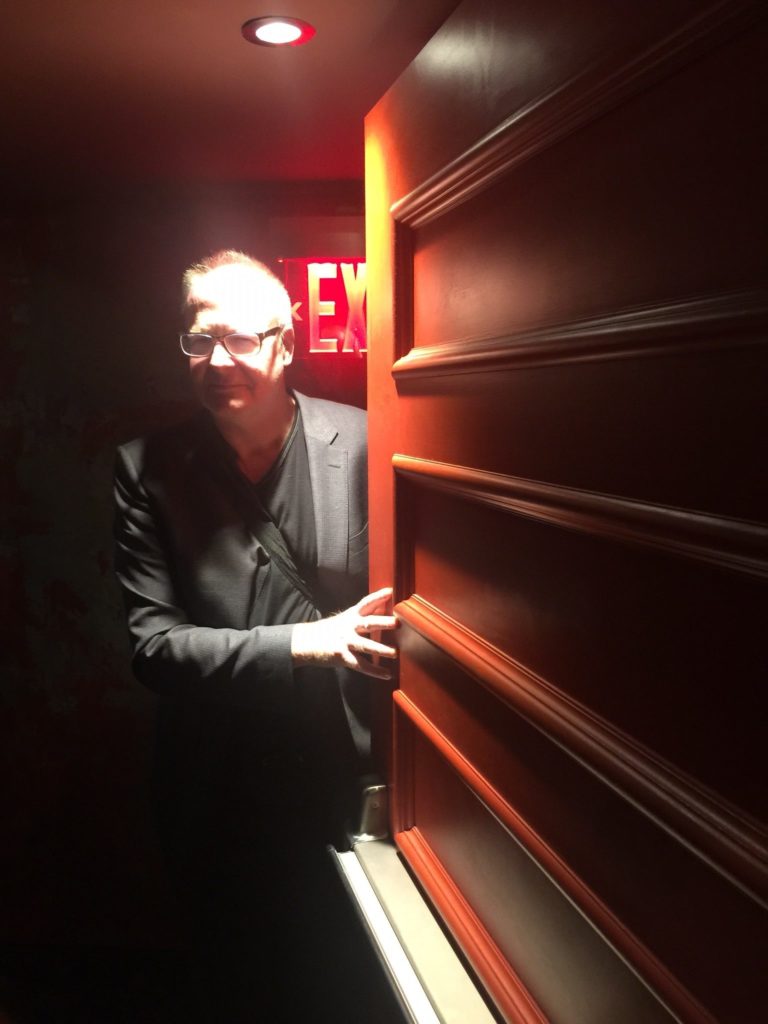
Peter Eckersall. Photograph by Frank Hentschker.
Sahar Assaf is an actress, stage director, and Assistant Professor of Theatre at the American University of Beirut. She recently co-established the AUB Theatre Initiative with playwright and English professor Robert Myers under which she translated and directed García-Lorca’s Blood Wedding in a site-specific promenade performance, and co-translated, co-directed, and starred in Shakespeare’s King Lear at al-Madina Theatre in Beirut, the first production of Shakespeare in colloquial Lebanese. She is a member of the Lincoln Center Directors Lab (2014), a member of Directors Lab North in Toronto (2017), co-founder and artistic director of Directors Lab Mediterranean (2019), and a Fulbright alumnus with an MA in Theatre Studies from Central Washington University (2011).
Peter Eckersall is Professor and Executive Officer of the Ph.D. Program in Theatre and Performance at the Graduate Center, City University of New York. He is also an Honorary Professorial Fellow at the University of Melbourne. Recent publications include The Routledge Companion to Theatre and Politics (co-edited with Helena Grehan; Routledge 2019) and New Media Dramaturgy: Performance Media and New Materialism (with Edward Scheer and Helena Grehan; Palgrave 2017). Peter is the dramaturg for Not Yet It’s Difficult (NYID), based in Melbourne, Australia.
This interview was enabled by a year-long research exchange between the Ph.D. Program in Theatre and Performance at the Graduate Center, the Martin E. Segal Theatre Center, and the Theatre Initiative, American University of Beirut. We gratefully acknowledge the support of the Graduate Center CUNY, the Martin E. Segal Theatre Center, and the American University of Beirut.
The editors of TTT express their gratitude to Sierra Carlson for typing up the recorded interview.
This post was written by the author in their personal capacity.The opinions expressed in this article are the author’s own and do not reflect the view of The Theatre Times, their staff or collaborators.
This post was written by Peter Eckersall.
The views expressed here belong to the author and do not necessarily reflect our views and opinions.

